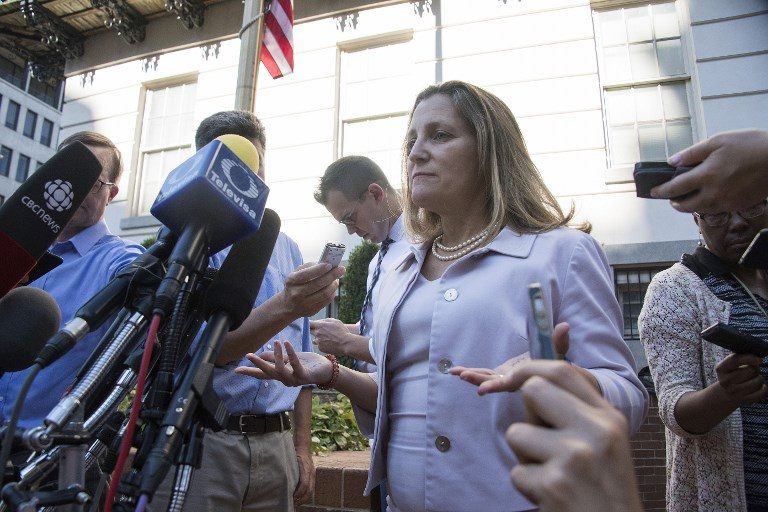SUMMARY
This is AI generated summarization, which may have errors. For context, always refer to the full article.

WASHINGTON, DC, USA – Canada and the United States still faced roadblocks as they went down to the wire Friday, August 31, in talks to salvage the North American Free Trade Agreement.
With the US deadline to get an agreement by Friday, there were reports the sides were struggling to find compromise on the NAFTA mechanism for resolving trade disputes and on Canada’s managed dairy market.
Talks continued late into the night again between Canada’s Foreign Minister Chrystia Freeland and US Trade Representative Robert Lighthizer, including one meeting late Thursday that lasted only a few minutes.
“The negotiations between the United States and Canada are ongoing. There have been no concessions by Canada on agriculture,” a USTR spokesperson told AFP, in the first comment from the US side since talks began Tuesday.
President Donald Trump has frequently criticized Canada’s high dairy tariffs and insisted the US will demand changes.
The White House plans to notify Congress on Friday of its intention to enter into a new free trade agreement in order to provide the required 90 days’ notice that would allow NAFTA 2.0 to be signed by December 1, when Mexico’s new president will take office.
Although Trump has threatened to leave Canada on the sidelines and proceed with a trade deal with Mexico alone, trade experts say the White House lacks the authority to substitute a two-party deal.
Progress?
Freeland had been resolutely upbeat all week saying the sides were making progress in the effort to bridge differences to preserve the three-nation trade pact with the US and Mexico.
“We’ve all had a night to reflect and I’m looking forward to hearing what Ambassador Lighthizer has to say this morning,” she told reporters.
Since announcing a breakthrough with Mexico on Monday, Trump and Canadian Prime Minister Justin Trudeau both have expressed optimism that a deal is close.
“We are replacing NAFTA with a beautiful, brand new US-Mexico trade deal,” Trump told a crowd in Evansville, Indiana late Thursday.
On the deal with Canada, he said: “I think it is going to happen and we really have developed a really good relationship. But they have to treat us fairly. They haven’t treated us fairly.”
Negotiators have worked for a year to update and rewrite the 25-year-old free trade pact, but have rushed in the past six weeks to get it across the goal line.
After Mexican officials worked out key issues on auto trade and worker rights, Canadian negotiators will need to find compromises on dairy trade rules, and how to handle some disputes among NAFTA partners, as well as patent protections for medicines.
Freeland has declined to comment on the specific issues, but news reports suggest talks remain hung up on the dispute settlement procedures in Chapter 19.
Sources told The Globe and Mail that the US had resisted Canadian demands to keep the binational panels that Ottawa has employed to defend against US anti-dumping and countervailing duties, notably against its key lumber industry.
The daily also said Lighthizer has been pushing Ottawa to abandon cultural protections in a redraft of the agreement.
Earlier this week, Prime Minister Justin Trudeau had suggested a deal was possible by Friday’s deadline.
After Trudeau spoke with regional leaders, they appeared to soften their tone in defense of Canada’s protected dairy sector, suggesting a compromise may be in the works that would grant the US greater access to the Canadian milk market.
If the White House notifies Congress on time, it will then have until September 30 to submit the final NAFTA agreement, but the sides will have to have the major points ironed out.
Trump is due to leave Washington just after midday on Friday for an event in North Carolina, which may add to the time pressures if the US president wants to be the one to announce any agreement.
– ‘Not good enough’ -While the United States appeared to be moving toward a deal with Canada and Mexico, Trump turned up the heat on the European Union and the World Trade Organization.
Trump rejected an EU offer to eliminate car tariffs if the United States does the same.
The proposal was “not good enough,” he told Bloomberg News. “Their consumer habits are to buy their cars, not to buy our cars.”
European Commission chief Jean-Claude Juncker warned the EU would hit back with tariffs of its own if Donald Trump made good on threats to slap duties on foreign cars.
Trump also threatened to pull the United States out of the World Trade Organization, which he has previously criticized for being unfavorable to Washington in its resolution of trade disputes.
“If they don’t shape up, I would withdraw from the WTO,” he told Bloomberg News. – Rappler.com
Add a comment
How does this make you feel?
There are no comments yet. Add your comment to start the conversation.